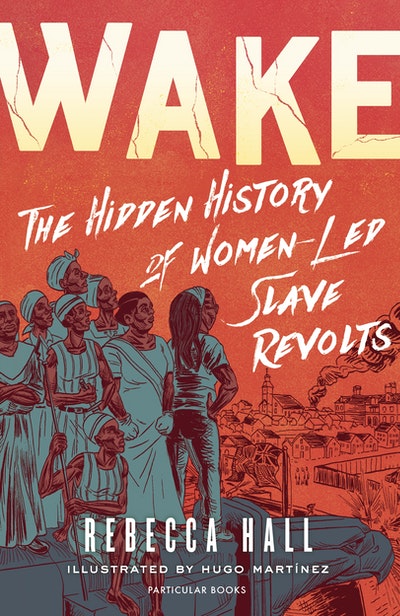Wake
The Hidden History of Women-Led Slave Revolts
- Published: 1 June 2021
- ISBN: 9780141997742
- Imprint: Penguin eBooks
- Format: EBook
- Pages: 208
A lot of Black history is uncelebrated narratives, but even within that history there are narratives that are especially overlooked; these tend to be the stories of Black women. Rebecca Hall's diligent research and intelligent storytelling has flipped that script to celebrate the brave enslaved Black women who fought and died for their freedom with dignity. Hugo Martinez's expressive art brings these women to vivid life on the page
Joel Christian Gill, author of Strange Fruit
Wake is a revelation. Rebecca Hall's sparse and perfectly chosen prose intersects with Hugo Martinez's beautiful woodcut-styled illustrations that uses the power of visual narratives that hearkens back to graphic masters like Lynd Ward and Frans Masereel. Hall's writing cleverly flows between the reality of her research on black women-led slave revolts and speculative ideas that uncover the spectrum of human experience and resilience
John Jennings, Eisner Award-winning illustrator of Octavia Butler's Kindred and Parable of the Sower graphic novels
Hall and Martínez connect the past and the present in a moving and exciting narrative that brings to light the history of slavery in the United States. Showing how enslaved women resisted slavery, even though their participation in rebellions remain largely absent from written records, Wake will be a crucial tool to introduce students to the problematic nature of slavery primary sources.
Ana Lucia Araujo, Professor of History, Howard University
Not only a riveting tale of Black women's leadership of slave revolts but an equally dramatic story of the engaged scholarship that enabled its discovery
Angela Davis
In this beautiful and moving graphic novel, historian Rebecca Hall unearths a history so often overlooked: the significant role Black women played in leading slave revolts. Through Hugo Martinez's vivid graphics, combined with Hall's brilliant insights and powerful storytelling, Wake transports the reader to a moment in time when a group of Black women set out to overturn the institution of slavery in British North America. Their courageous story, told with remarkable skill and elegance, offers hope and inspiration for us all.
Keisha N. Blain, author of Set the World on Fire
In Wake, Rebecca Hall and Hugo Martinez use the graphic medium to stunning effect. More than just a history, Wake is a meaningful engagement with a living past. Read this book slowly. Savor the visual metaphors. Let them take you back in time while Hall's narration pins you to the uncomfortable present. Make your reading a shared journey with friends or classmates who can help you uncover the deep meanings and cope with the emotions it raises. This book will haunt you the way that the legacies of slavery haunt this country.
Trevor Getz, author of Abina and the Important Men
Rebecca Hall makes accessible the historians' craft in the service of telling the powerful stories of women-led slave revolts. Mincing no words, Hall captures the fierceness of Black women's resistance. Infusing the text with her personal story and a sharp historical imagination, Hall never waivers in giving life to this history. She brings into the present stories that must be read and passed on.
Rose M. Brewer, Professor, University of Minnesota-Twin Cities
Wake's text is spare, informed, tuned to vibrating feeling and thought about historical and contemporary Black women's agency and actions in resistance and rebellion. As powerful as the text, are the astonishing graphics. Reading, I was drawn into frame after frame of graphic action and evocative description. These drawings brought me to tears, recognition, fury, gratitude, solidarity.
Donna Haraway, Professor Emerita in the History of Consciousness Department and Feminist Studies Department, UCSC
Knowing differently is key to the movement as we newly reckon with what has been memorialized in our past. We are lucky to be in Rebecca Hall's wake as we look again toward the future, with fresh eyes from visualizing a deeper relationship to the revolutionary black feminist spirit that brought us here.
Gina Dent, Associate Professor in Feminist Studies, UC Santa Cruz
An urgent, brilliant work of historical excavation
Kirkus
Stunning. . . With its remarkable blend of passion and fact, action and reflection, Wake sets a new standard for illustrating history
NPR
Powerful.... Wake is operating in the wake of slavery, and in a state of being awake to the past, a process Hall frames as both devastating and grounding
New York Times Book Review
A must-read graphic history. . . an inspired and inspiring defence of heroic women whose struggles could be fuel for a more just future
Rosemary Bray McNatt, Guardian
Hall and Martinez deserve tremendous credit for their work in making this research accessible. . . a superb accomplishment on every level
Popmatters




